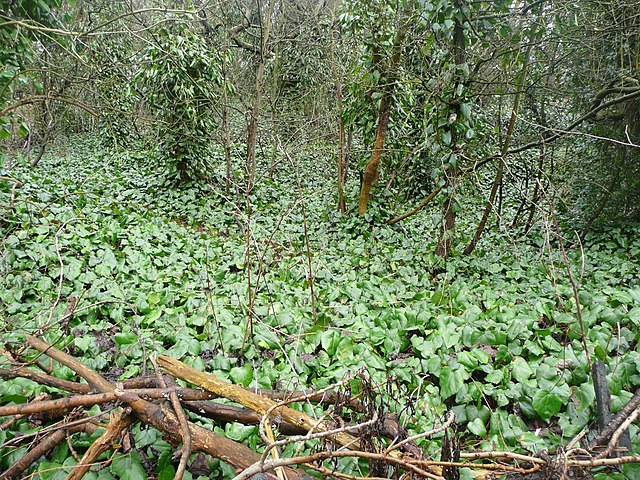
Ivy. Image courtesy of Wikimedia Commons, licensed under CCO 2.0.
When we moved into our little house, the large beds of English ivy in the front yard didn’t bother me much. It’s not what I would have chosen—who would choose an invasive species?—but my spouse and I agreed we would come up with a Yard Plan and make strategic choices, slowly and deliberately, including eradicating the ivy. Getting rid of ivy is notoriously difficult—my mom warned me it’s “backbreaking work.” I was also, when we moved in, finishing a book project, then in its sixth year and finally arriving at the fact-checking stage. The ivy project existed in the future.
One day, in a stolen moment of daylight, I was sitting around in our front yard with my spouse and small childwhen I noticed a little ivy creeper reaching out, venturing beyond its bed into the grass. The beds were bad enough as it was, but they certainly could not be permitted to grow. So, I grabbed it and pulled. It did not yield. Tough guy, huh? I regripped and pulled harder, and it popped out of the ground, spraying dry dirt in my face. I was elated. I had contained the ivy. I grabbed another vine and pulled.
That was the beginning. From that moment forward, all I wanted to do was rip ivy out of the ground. The ivy beds were just outside my office window, and I knew they were sending out their little traveler vines and growing their territories whenever I looked away. I started ripping ivy while the baby napped. I started ripping ivy while on calls with editors and sources. I invited a neighbor who had (in my defense, unknown-to-me) back problems to come over and rip ivy with me as a social engagement. (She joined me, and hurt her back.)
Ivy’s presence in a yard is binary: all of it has to go, or those green leaves will spring back up at the next rain. I heard this time and again from neighbors who wandered by as I hunched over my work; it seemed everybody had an ivy-pulling story. One couple stopped repeatedly to tell me that ivy is the work of the Devil. A man took pains to tell me I would never win—it would just come back again. Okay, I said. We’ll see, I thought.
I began to develop my own ivy-pulling techniques: I would pull up on the easy, thin, green traveler vine to see where it came from, what larger root system sponsored it. Usually it intersected with another vine cluster. If I was feeling aggressive I would rip them both out at once with my bare hands. I used clippers to chop through any roots too thick to pull. When I pulled an especially long vine and root system out, it would snap in the air like a whip. Then I would break it in half and throw it on the enormous and growing pile of my dead.
I started seeing ivy tangles when I closed my eyes, ivy in my dreams. Late at night, without the option to do my work (pulling ivy), I had to focus on my real work, the enormous pile of unchecked facts, the documents that needed scanning, the sources who needed calling yet again. I had expected fact-checking to be a phase of delegation after I hired a fact-checker, but in fact I had to spend quite a lot of time preparing, organzing, in order for her to be able to work. How were these facts so unruly?
Slowly, over the course of three months, the ivy beds shrank. My misplaced diligence had a tangible effect: I was winning. I got sunburned, my hands blistered, and my back did start to hurt, but: I won. The ivy has not come back. The battle with the facts ended, too: my book was published in March of 2022, and I’m not going to say more about that because I don’t want to jinx it.
And so our yard is ivy-less. But I honestly miss the job. Without facts to check or vines to pull, I have felt a little lost, a little aimless. Unmoored. When I take walks in the park, I very casually rip out the vines intruding on the pathway as I breeze by; I eye my neighbors’ yards of complacent ivy with anxious, compulsive envy and wonder how weird it would be to offer help. Every once in a blue moon, from somewhere underground, a little ivy creeper will spring up on the edges of my yard. I am always elated to see it; it feels like running into a long-lost friend. I jump to rip it out.
Mary Childs is a host of NPR’s Planet Money podcast, and the author of The Bond King: How One Man Made a Market, Built an Empire, and Lost It All, from Flatiron Books.
from The Paris Review https://ift.tt/ZWMPNIa
Comments
Post a Comment